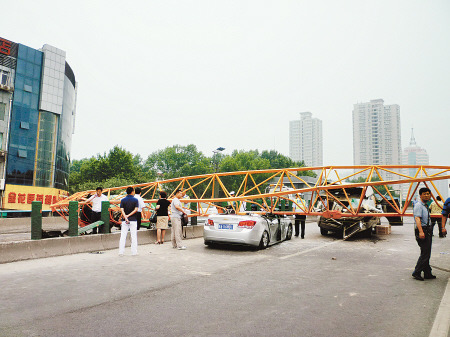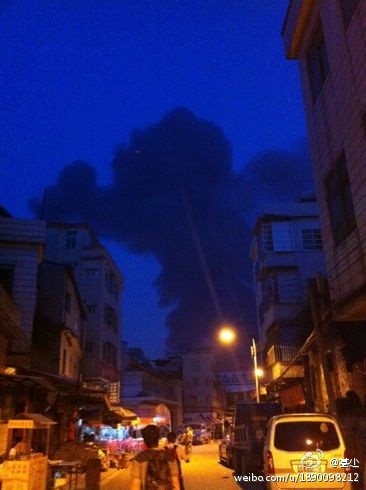Blogs » Society » Chillax With Jason Mraz: Footage From His Beijing Trip
Blogs » Society » Chillax With Jason Mraz: Footage From His Beijing Trip |
- Chillax With Jason Mraz: Footage From His Beijing Trip
- ‘Xi Jinping Millionaire Relations Reveal Fortunes of Elite’: Bloomberg
- Tell the Shaanxi government, we’re very angry
- The Manchu Legacy
- Our China Entertainment Lawyer Rocking The Movie Biz
- Friday Links: Bloomberg’s almost-controversial Xi Jinping story, The Gray Lady in China, and introducing: The English Chinese New York Times
- South China Morning Post’s Slide Toward Irrelevance?
- Watch: North Korean defector returns to the DPRK and tells of the evil South
- The double life of Dali Lake
- Top Ten Search List (June 29)
- Oil Tanker Crash Results In 20 Deaths, 2,000-Square-Meter Conflagration
- College Kids Can Be Such Assholes
- School beauty seeks bodyguard with annual salary 100,000 yuan
- China gets its own face-eater
- Vice principal of ECNU high school accused of molesting boys
- Watch: Shenzhou 9 returns to earth
- Live coverage of ‘Shenzhou-9’ abruptly replaced by L’Oreal adverts
- Veteran reporter Paul Mooney tells how he got sidelined by new SCMP editor Wang Xiangwei
- Is This Young Lady Really That Offensive?
| Chillax With Jason Mraz: Footage From His Beijing Trip Posted: 29 Jun 2012 07:30 PM PDT Grammy Award-winning singer-songwriter Jason Mraz played in Beijing on June 12 as part of his Tour is a Four-Letter Word, marking his first time in China. Without any opening, he and his band played an hour, then did an encore. That's a lesson here that big-name foreign musical acts would do well to heed: respect the crowd, and they'll respect you. Those inside Workers' Gymnasium seemed to love Mraz, often chanting, "Jason! Jason!" Thanks to Youku user xiaozhunanhai, the full concert is embedded after the jump, in surprisingly high definition. The above video is after the jump on Youku as well, for those in China.
Even higher definition, on YouTube (via Yinyuetai.com, where there are more videos): |
| ‘Xi Jinping Millionaire Relations Reveal Fortunes of Elite’: Bloomberg Posted: 29 Jun 2012 07:01 PM PDT Tracking down the wealth of China's officials and their relatives hit high gear after the Bo scandal. Now Bloomberg has published an extensive, if not especially well-organized, report on the wealth of the relatives of Vice President Xi Jinping, the man tapped so far to be next president, 'Xi Jinping Millionaire Relations Reveal Fortunes of Elite.' I have to say that when I saw and began to read the piece, I had one of those heart in the throat moments. From all I have seen, Mr. Xi seems all right, as does his wife, the General. So, I thought, here we go again. But according to the article: No assets were traced to Xi, who turns 59 this month; his wife Peng Liyuan, 49, a famous People's Liberation Army singer; or their daughter, the documents show. There is no indication Xi intervened to advance his relatives' business transactions, or of any wrongdoing by Xi or his extended family. That's a relief. And, it's also a comfort to know that if Mr. Xi needs some cash, he won't have resort to corruption–he can just get a loan from his very wealthy relatives. |
| Tell the Shaanxi government, we’re very angry Posted: 29 Jun 2012 10:33 AM PDT  This is the 1510 Digest, a weekly roundup of recent essays and articles published in Chinese on My1510.cn, with links to translations on the Marco Polo Project. Today's first posting is the tale of an angry citizen calling Shaanxi provincial government offices to complain about the recent forced abortion scandal. Tell the Shaanxi provincial government, we're very angry American apologies for the Chinese exclusion act and black protests in Guangzhou Encounters ★★★★★ All articles in this digest and a large range of other Chinese readings are accessible at Marcopoloproject.org. Some are available in English, French and Spanish translation. (You can join the project if you'd like to help with translations.) Danwei is an affiliate of the Australian Centre on China in the World at The Australian National University. This posting is a result of one project that is part of that on-going collaboration. China Heritage Quarterly and East Asian History are two other publications supported by the Australian Centre on China in the World. |
| Posted: 28 Jun 2012 06:00 PM PDT
This posting includes an audio/video/photo media file: Download Now |
| Our China Entertainment Lawyer Rocking The Movie Biz Posted: 29 Jun 2012 09:22 AM PDT Our lead China entertainment lawyer (and regular CLB contributor), Mathew Alderson, was just named by Variety Magazine as one of 50 "Game-Changing Attorneys" who "rock the [entertainment law] biz." And, hey, we couldn't be prouder. The list consists of those "attorneys whose recent deals and court battles have changed the shape of entertainment," and near as we can tell, Mathew is the only one based in China. Variety had this to say about Mathew:
We like it. If you are interested in China movie law, check out the following posts Mathew has written for us:
|
| Posted: 29 Jun 2012 08:59 AM PDT
We're bumping the musical outro to tomorrow morning. China news never ceases — here're links to prove it. A report that got Bloomberg temporarily blocked in China: "As Xi [Jinping] climbed the Communist Party ranks, his extended family expanded their business interests to include minerals, real estate and mobile-phone equipment, according to public documents compiled by Bloomberg. // Those interests include investments in companies with total assets of $376 million; an 18 percent indirect stake in a rare- earths company with $1.73 billion in assets; and a $20.2 million holding in a publicly traded technology company. The figures don't account for liabilities and thus don't reflect the family's net worth. // No assets were traced to Xi, who turns 59 this month; his wife Peng Liyuan, 49, a famous People's Liberation Army singer; or their daughter, the documents show. There is no indication Xi intervened to advance his relatives' business transactions, or of any wrongdoing by Xi or his extended family." Run by the excellent Philip Pan and former Caixin reporter Cao Haili: "The New York Times is introducing a Chinese-language Web site, part of a continuing effort to expand its reach to international readers. // The site, which is called cn.nytimes.com and went live Thursday morning China time, is intended to draw readers from the country's growing middle class, what The Times in its news release called 'educated, affluent, global citizens.' // The site will feature about 30 articles a day on national, foreign and arts topics, as well as editorials. Joseph Kahn, the paper's foreign editor, said that about two-thirds of the content would be translated from Times articles and one-third would be written by Chinese editors and local freelance journalists." [Media Decoder, NY Times] All that studying for gaokao, and then? "As the debate heats up, a 2006 survey about China's higher education has resurfaced as a topic on China's Twitter-like microblogs. The China Youth Daily-QQ.com survey says that among the 8,777 web users who answered the online survey, 34.7% said they "regret" that they went to college, and 51.5% said they 'didn't learn anything useful' in college. // …A number of microblog users complained that they are facing unfair competition for jobs from the children of the powerful and wealthy. One said, 'Competing to win a job has now become competing to show who has a more privileged daddy.' A tougher job market has raised the volume of such grievances." [Wall Street Journal] Uh, yeah… want. "A software program that can recover deleted posts from the mainland microblogging site Sina Weibo has been developed at the University of Hong Kong. // Mainland censors monitor the Chinese version of Twitter for politically sensitive posts and delete them but a university pilot project, WeiboScope, allows researchers to recover and analyse the deleted postings. After beginning work on the project early last year, researchers are starting to share their findings." [South China Morning Post] Taiwan dude going around the world, just not China. "A Taiwanese man is about to embark on a six-month world tour during which he'll repeatedly transform himself into a human flag, reports ITN. // …According to the International Business Times, the cyclist says he plans to spread the word about Taiwan as he visits countries around the world. China is not on his list, however." [Huffington Post] Zombies. Gotcha. "An intoxicated bus driver has been detained after he gnawed on a female driver's face after blocking her car on a road in Wenzhou City of Zhejiang Province, local media reported yesterday." [Shanghai Daily] Above and beyond their duties. Must've been a slow day in law enforcement? "A Russian man named Sergei travelled to Ningbo and his passport was throw away by a hotel cleaning staff as a litter, After learning about the situation, the police went to the waste transfer station and after turning five tons of garbage upside down, the police found his passport, When Sergei was on his way to the consulate in Shanghai to apply for another passport, After hearing that the police found his passport in garbage,he just couldn't believe it." [China Whisper] Shenzhou-9 returns to Earth interlude: Finally… "Articles written in English, translated into Chinese by humans, and translated back into English by Google (by @zseward)." [The English Chinese New York Times] "Legendary" physics teacher fired for sexually harassing (molesting?) students. [Offbeat China] Great stories linked to by Danwei: This is the 1510 Digest, a weekly roundup of recent essays and articles published in Chinese on My1510.cn, with links to translations on the Marco Polo Project. |
| South China Morning Post’s Slide Toward Irrelevance? Posted: 29 Jun 2012 05:59 AM PDT Veteran reporter (not black comedian) Paul Mooney, whose contract with South China Morning Post was not renewed last month, delivered quite the parting shot at his former employer in the Hong Kong e-magazine iSun Affairs, and he names names. Mooney, a multiple-award-winning journalist, aimed his worst at editor-in-chief Wang Xiangwei, delivering possibly the second most damning insult one journalist can give another of the free press (most damning being plagiarism):
Any self-respecting journalist would, besmirched like so, blanch, then clench the jaw and seethe, "This means war." Wang? We're not sure exactly how self-respecting he is, and we don't know what he'll say to Mooney, if anything. But we do know that he's wont to send emailed statements, because that's how he replied to the Wall Street Journal recently when WSJ reported on journalistic self-censorship in Hong Kong:
You can almost see every SCMP reporter mouthing "Blah, blah, blah" in response to Wang's very PR-y email. Here's Mooney again:
This all began — or was brought to the fore — by a curious editorial decision earlier this month to reduce a news feature about Tiananmen dissident Li Wangyang's death to a brief. SCMP subeditor Alex Price publicly accused Wang of censoring the story. Specifically, according to Asia Sentinel on June 19:
Wang's action caused "several political groups" to demonstrate outside of SCMP's office, according to SCMP, and apparently "more than 30 staffers signed a petition last week," according to WSJ in its story about self-censorship. Wang, a former China Daily reporter who Mooney describes as having never "pounded the sidewalks," has never been popular in Hong Kong media circles, which I imagine can be as cutthroat, vindictive and spiteful as any media clique in the world (I say this as a disclaimer against everything you've read — including in this space — about Wang Xiangwei). According to the linked Asia Sentinel piece, under a section titled "Xiangwei the final nail in SCMP coffin?":
The paper's owner, Malaysian tycoon Robert Kuok, seems unlikely to remove Wang from his post, and I imagine Wang has too much pride to resign. (He might yet prove me wrong — we'll see.) Where does that leave us? South China Morning Post, a news-maker that finds itself squarely in the news — about as bad a place as any that a media company can find itself. The vultures are circling. You never want to be a victim of journalism, a journalism professor once said to us in class. Wang is about to find out exactly what that — and "free press" — really means. |
| Watch: North Korean defector returns to the DPRK and tells of the evil South Posted: 29 Jun 2012 03:15 AM PDT A North Korean woman by the name of Pak Jong Suk who escaped to the South by way of China in 2006 has returned to the DPRK and lived to tell the story. Here's what she said in the most unusual press conference according to the DPRK's Korean Central News Agency: [ more › ]     |
| Posted: 28 Jun 2012 11:17 PM PDT A birdlife sanctuary that's also a fishery, and whose staff spend their time scaring herons away – welcome to Dali nature reserve. Zhou Wei reports from Inner Mongolia. Every spring, migratory birds start arriving at Dali Lake in Inner Mongolia just as the fish-breeding season gets under way. This has been the time – at least until recently – when herders living around the lake have heard the sounds of firecrackers going off. You might think setting off small explosions was against the rules in a designated sanctuary for migratory flocks, and that reserve staff would be battling to stop them. In fact, the people trying to frighten away the birds appear to be the same charged with their protection. Such jarring tales are not uncommon in China's reserves, where conservation needs frequently do battle with economic priorities. Dali Lake Nature Reserve is meant to provide a safe space for more than 100 kinds of birds, from swans and white-naped cranes to the great bustard. But protection efforts are hampered by the agenda of the business next door: the reserve runs in parallel with a fishery, operated by the same staff, though under a different name. Locals say they didn't hear the firecrackers this year. No one I spoke to knew the reason for the pause, but in any case it appears the damage has been done; bird numbers have plummeted. Like many other reserves in China, Dali is torn between its conservation duties and the pursuit of profit. Now, as fish and birds both face crisis, the falseness of this choice is clearer than ever. Dali means vast or limitless in Mongolian. The lake lies on the fertile grasslands in the west of Hexigten Banner and is a resting place for migratory birds. It was made a county level nature reserve in 1986, and upgraded to a national reserve in 1997. Reserve staff maintain that the dam was built to protect fish stocks and reduce the loss of roe to the river's flow. Outside observers say it was erected to block off migratory routes and prevent fish from swimming too far away. Either way, the dam was designed to preserve yields. But has it worked? The signs suggest not. Monitoring data indicates that water in the lake has been getting steadily saltier and is now almost as saline as the fish can tolerate; dams are associated with risk of increased salinity. For the Amur ide, which spawns in fresh water, the change poses a threat to survival.
|
| Posted: 29 Jun 2012 03:39 AM PDT Here is today's top ten real-time search list, recorded at 2:17PM. 1. 抓拍公车私用 zhuāpāi gōngchēsīyòng – "Candid Shots of Public Vehicles in Private Use": An elderly Guangzhou man by the name of Qu Shaokun, lovingly known by fellow townspeople—and now by netizens—as "Uncle Qu," has risen to national fame with the help of two cell phone cameras and a sense of civic duty. Six years ago, coming out of a brief stay in the hospital, Qu was walking down the street when the driver of a car coming from behind him tried to forcefully honk him out of the way. When he turned around and saw that it was a police car, but a police car coming out of a bar parking lot and definitely not on its way to some official mission, he shouted out on impulse, "Public Vehicle, Private Use!" ("Gōngchēsīyòng!") and immediately called in to report what he'd seen; soon after, he received word from the police department confirming the veracity of his report and informing him that the appropriate disciplinary measures had been taken. Thus began Qu's six-year (to date) self-appointed tenure as an unflagging "Gongchesiyong" watchdog. Qu has so far successfully reported 100 instances of Gongchesiyong, and is a public hero for his devotion to equality before the law. Here's the story in Chinese. 2. 甘肃牛奶投毒 Gānsù niúnǎi tóudú – "Gansu Milk Poisoners": On June 27th, the Higher People's Court of Gansu Province opened the public hearing of Pingjing dairy farmers Ma Xiuling and Wu Guangquan, who in April of 2011 intentionally tainted a local competitor's milk with nitrite, subsequently poisoning 35 townspeople and killing 3 children. Here's the story in Chinese. 3. 神九返回直播 Shénjiǔ fǎnhuí zhíbō – "Shenzhou's Back Live Broadcast": China's most recent manned space mission has now concluded, with the successful return of the Shenzhou-9 spacecraft to earth. The team landed in Inner Mongolia. Liu Yang, China's first female astronaut, was the first to exit the spacecraft. Here's the story in Chinese. 4. 温州啃脸男 Wēnzhōu kěnliǎnnán – "Wenzhou Face-Eater Man": The U.S. is no longer alone when it comes to being home to a southeastern face-eater. On June 26th in the early afternoon, an intoxicated Wenzhou bus driver (too much too drink at lunch with his buddies, according to police) climbed onto the hood of a female drivers car, banged on her windshield, grabbed her, attacked her on the ground, and then…starting gnawing on her face. The police found it extremely difficult to pry him off of his victim, because he was "acting so crazy." Here's the story in Chinese. 5. 蕾娜-格雷克 Lěinà Géléikè – "Lena Gercke": This past Wednesday, the German Football Association asked Germany's next top model winner Lena Gercke, girlfriend of midfielder Sami Khedira, to dress as modestly as possible and generally tone down her appearance during the Euro 2012 semi-finals, as she has apparently been stirring up too much jealousy among the wives and girlfriends of other players—to the point of threatening morale within the team itself. So, Chinese soccer fans are now searching Lena's name along with the rest of us, of course in the interest of understanding the game from all angles. Here's the story in Chinese. 6. 末位淘汰可索赔 mòwèitáotài kě suǒpéi – Yesterday, the Supreme People's Court notified reporters that it is seeking the advice of the community as it deliberates over the appropriate judicial interpretation of laws related to the hiring and firing practice referred to as the "Bottom Out" principle ("mòwèitáotài" = literally, "last place eliminated"), by which the least competent employee, when it becomes clear to employers who that is, may be fired at any time, without warning, simply because he or she is in "last place". The way deliberations are going, it seems that the Supreme Court may soon grant employees the right to seek compensation if they have been fired purely as a result of Moweitaotai. Here's the story in Chinese. 7. 罗伊斯-怀特 Luóyīsī Huáitè – "Royce White": As devoted NBA fans, many Chinese netizens were concerned about the fate of Royce White, projected first-round pick in the NBA draft, when it came to light that his chances may have been hurt due to his fear of flying (pteromerhanophobia, for the lay people out there), related to his anxiety disorder. Now that he's landed with the Houston Rockets, things seem like they're going to be okay. Here's the story in Chinese. 8. 广州油罐车爆炸 Guǎngzhōu yóuguànchē bàozhà – "Guangzhou Tanker Explosion": A major traffic accident occured this morning at 4:30AM on the Yanjiang highway in Guangzhou, when a truck rear-ended a tanker with a 40-ton oil load, setting off an explosion and a massive fire that got so out of hand as to caused damage to surrounding buildings. 20 people were killed and 27 injured in the explosion. Here's the story in Chinese. 9. 贾斯汀-汉密尔顿 Jiǎsītīng Hànmì'ěrdùn – "Justin Hamilton": More NBA news—this time of LSU center Justin Hamilton being selected with the 45th pick of the draft by the Philadelphia 76ers—attracts netizen attention as the results of Thursday evening's draft trickle in. ("Late Thursday night" in the U.S. conveniently overlaps with midday Friday in China: peak cubicle procrastination/NBA-draft-pick-checking time). Here's the story in Chinese. 10. 张瑞芳 Zhāng Ruìfāng – Famous mainland Chinese film actress Zhang Ruifang passed away last night, at the age of 94. As the nation celebrates the life and mourns the loss of one of China's irreplaceable and beloved "Four Dan Actresses" (sìdàmíngdàn 四大名旦 = a title given to Zhang and three other brilliant leading ladies in Chinese history), Weibo users join in to wish her a "pleasant journey to the next life" and to sing her praises as a true unforgettable "classic" of Chinese art and culture. Here's the story in Chinese. |
| Oil Tanker Crash Results In 20 Deaths, 2,000-Square-Meter Conflagration Posted: 29 Jun 2012 03:54 AM PDT Now we know what kind of explosion results when a tanker with 40 tons of gasoline crashes. Early Friday morning in Guangzhou, thousands were abruptly woken when an oil tanker truck collided with another vehicle, setting off a tremendous explosion and fire that reportedly covered 2,000-square meters. The Associated Press reported on this about an hour ago, and interviewed a Guangzhou resident who lives 2 kilometers from the crash:
Apparently the 20 who died (and at least
|
| College Kids Can Be Such Assholes Posted: 29 Jun 2012 01:33 AM PDT Some students from the Yunnan Traffic Technician College in Kunming have recently incited netizen anger. As posted on Sina Weibo yesterday, the above picture shows a street urchin standing on another's back to grab a bottle on a string, which they can exchange for 1/20th of one yuan. Why is the bottle on a string? Apparently, college students put it there to taunt the children, dangling 0.05 yuan tantalizingly out of reach. China Daily tells us, "The children said they live in a village near the college, get up at 7 am to collect recyclable garbage, and sell them to make money. Among the children is a girl nicknamed Shasha, whose father works at the college as a cleaner and mother collects garbage." "Big brother, toss the bottle!" the kids have been heard calling to the students. When the students chose not to, the young'uns took matters into their own hands, learning a valuable life lesson in the process about initiative and perseverance. We can only hope Yunnan Traffic Technician College teaches half that much. (H/T David B.) |
| School beauty seeks bodyguard with annual salary 100,000 yuan Posted: 28 Jun 2012 10:41 PM PDT June 28th, 2012 by Key | Posted in News | No Comments » From Chinanews:
"Since I have been stalked, my door has been knocked on by strangers, and I feel obsessed by the news that a girl was attacked by a knife on the street, I decided to hire a male bodyguard in Nanjing! Here are the requirements: be able to fight against three people, and have good personality. To ensure my safety… the total salary for three years could be RMB 300,000 for the qualified candidate." Recently, such a microblog entry appeared on the internet. It was forwarded over 10,000 times and commented by over 1,000 people within a single day. The reasons for its popularity are first, there is a famous internet marketer among its forwarders, and second, the girl is from Nanjing University and is labeled as "school beauty".
The information gathered by some netizens show that the girl is a junior in Nanjing University and is the leader of the school table tennis team. Her name is Li Jiannan. She participated in some entertainment show on Jiangsu Satellite TV not long ago. And on her microblog, there are many a sexy photos, which are photographed on her own. "Such hype is pretty low-graded." Many netizens criticized the girl's act. Some netizens even pointed out directly that the so called evidence of pervert was totally faked, because right next to that photo was a sexy photo of the girl. "I did not mean to create hype with this microblog entry. I am really concerned about my own safety and hence I would like to find the qualified bodyguard through the internet." In the storm of online questioning and criticizing, yesterday, a journalist from Jiangnan Times somehow found the heroine Li Jiannan. "One month ago, I was stalked by a man who is in his 30s, and I was scared. The other night at around 8pm, I was harassed by another strange man, who stalked me and kept knocking on my door, asking for my phone number." In order to hide from that man, Li Jiannan even moved to a new place recently. "This incident not only made me scared, but also my family is worried. In fact, it was my family who first raised the idea of hiring a bodyguard for me." said Li Jiannan. And then she posted the recruitment information on microblog. "My friend said the monthly salary of bodyguard is over RMB 10,000 nowadays. That is why I proposed an annual salary of RMB 100,000. I only wanted to find an excellent bodyguard and had no other intentions." said Li Jiannan. As for the later intervention of internet marketer "Qingchun Hongzhi", it was just some help between friends. How could a university junior afford to offer an annual salary of RMB 100,000 to hire a bodyguard in public? Many people expressed negative comments and questioning, deeming it some boring publicity stunt and game. "My family' income is average. But even if my family is poor, isn't it a normal thing to hire a bodyguard to protect the child if she is harassed?" During her conversation with the journalist, Li Jiannan emphasized again and again that she was not some affluent 2nd generation (rich 2nd generation), and even the label of "school beauty" was initiated by netizens. Li Jiannan told the journalist that she had decided to give up online recruitment. Her parents called her and they thought it was not reliable to hire a bodyguard through internet. They thought it would be more reliable to hire someone back in her hometown in Liaoning. "I hope I could find a qualified bodyguard and come back to Nanjing in the coming new semester." Li Jiannan said. After she hires a bodyguard, she will ask him to find another job during the day and protect her at night, and the monthly salary would be around RMB 7,000 – 8,000. Tags: bodyguard, Chinese girl, Hype, Nanjing, School, school beauty |
| Posted: 29 Jun 2012 01:26 AM PDT  Police in Wenzhou detained an inebriated bus driver yesterday after he blocked the car of a female driver and began gnawing on her face. No kidding. [ more › ] Police in Wenzhou detained an inebriated bus driver yesterday after he blocked the car of a female driver and began gnawing on her face. No kidding. [ more › ]     |
| Vice principal of ECNU high school accused of molesting boys Posted: 29 Jun 2012 12:38 AM PDT     |
| Watch: Shenzhou 9 returns to earth Posted: 28 Jun 2012 11:50 PM PDT Shenzhou 9 returns to earth after a historic 13-day space mission to manually dock a spacecraft in orbit. Among the three astronauts was China's first female taikonaut, 33-year-old fighter pilot Liu Yang. [ more › ]     |
| Live coverage of ‘Shenzhou-9’ abruptly replaced by L’Oreal adverts Posted: 28 Jun 2012 11:57 PM PDT BEIJING (China Daily Show) – Confusion has greeted an unexplained decision to suddenly cut live coverage of the Chinese spacecraft's re-entry to Earth. |
| Veteran reporter Paul Mooney tells how he got sidelined by new SCMP editor Wang Xiangwei Posted: 28 Jun 2012 10:50 PM PDT  If there is one thing you need to read today, this is it: Multiple award-winning veteran reporter Paul Mooney, who has picked up some 10 awards in his last three years on contract with the South China Morning Post (that's on top of his 19 years freelancing for them before that), says the paper "no longer has the status it had in the late 1990s" and "may be beyond the point of return". The man to blame for this sad state of affairs is the paper's new editor-in-chief Wang Xiangwei who made international news last week when an exchange between him and a sub-editor over his decision to reduce a major breaking story on the suspicious death of Tiananmen dissident Li Wangyang to a brief was leaked to the media. [ more › ] If there is one thing you need to read today, this is it: Multiple award-winning veteran reporter Paul Mooney, who has picked up some 10 awards in his last three years on contract with the South China Morning Post (that's on top of his 19 years freelancing for them before that), says the paper "no longer has the status it had in the late 1990s" and "may be beyond the point of return". The man to blame for this sad state of affairs is the paper's new editor-in-chief Wang Xiangwei who made international news last week when an exchange between him and a sub-editor over his decision to reduce a major breaking story on the suspicious death of Tiananmen dissident Li Wangyang to a brief was leaked to the media. [ more › ]     |
| Is This Young Lady Really That Offensive? Posted: 28 Jun 2012 11:02 PM PDT Jemimah Steinfeld, writing in Global Times, seems to think so. Let's jump straight to her conclusion: "The Netherlands were quickly knocked out of Euro 2012. They weren't the only losers. So long as women continue to strip to catch the attention of football players, we all are." What about people who enjoy masturbating to pictures of scantily clad women? Are they also losers? Will quote just one more sentence from Steinfeld's piece, her first one: "For the latest reminder about how chauvinist football can be, look no further than China Buzz." Two problems: first, we need reminders? Jemimah, you wrote that just to give people an excuse to google Larissa Riquelme, didn't you? Also, this. Second, China Buzz's stories include "Soft model Phoebe Xu Ying's nude photos leaked amaze netizens," "Gan Lulu has in-bed shots released" and "Woman spread legs out wide on bus" — is this really the site we should be citing? (For the record, the images were posted on this Chinese blog.) Should we really be fashioning an editorial in China's second-biggest English-language newspaper around these pictures? Without even publishing said pictures? Here's the image Global Times went with: Now that's offensive — to everyone who's ever picked up a pencil and drawn. Without further ado, here are the rest of those pictures of that model whose team of choice didn't even make it out of the Euro's group stages. Perhaps next time she'll wise up and swathe herself in azure. |
| You are subscribed to email updates from Update » Blogs » Society To stop receiving these emails, you may unsubscribe now. | Email delivery powered by Google |
| Google Inc., 20 West Kinzie, Chicago IL USA 60610 | |



 Mathew Alderson
Mathew Alderson






















Comments